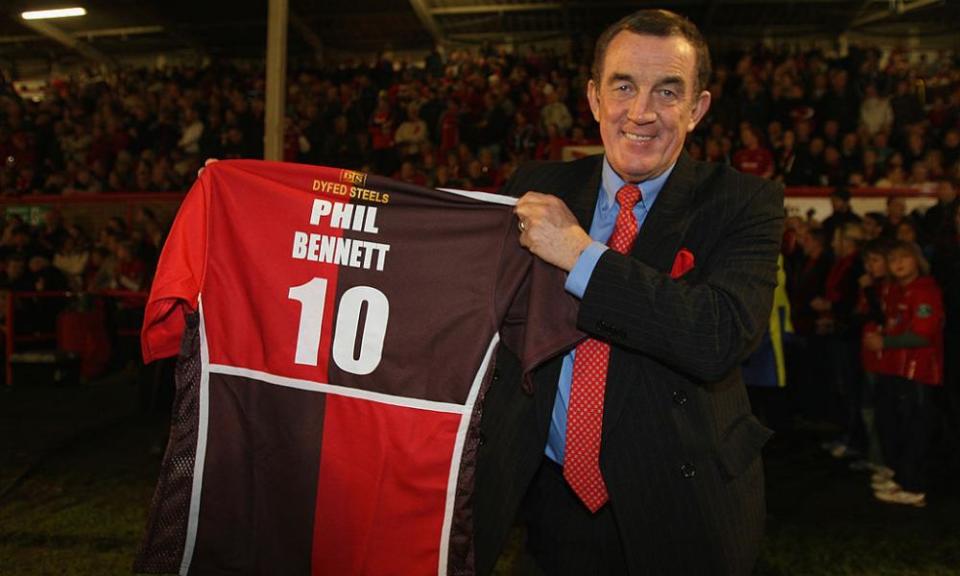Phil Bennett obituary
In the golden age of Welsh rugby during the 1970s, no player more personified the national side’s artistry and the passion for the sport than Phil Bennett. The mercurial Llanelli No 10, who has died aged 73 of throat cancer, came from a strong national tradition of fly-halfs.
At Llanelli he developed his game under the coaching genius of Carwyn James. Before long the 20-year-old Bennett was exchanging the scarlet jersey of Llanelli for a similarly hued jersey of Wales when he won a first cap as their first ever replacement for an injured player, Gerald Davies, at the Stade de Colombes, Paris, in 1969. He never touched the ball.
Related: The Breakdown | Rugby’s dazzling wizard Phil Bennett converted plenty to the oval ball
Wales, though, knew they had a fly-half of genius and one who would step out of the long shadow of Barry John when the country’s then leading points-scorer announced his shock retirement from the game in 1972.
He was still a slight figure, standing only 5ft 7in, but his acceleration and devastating sidestep left some of the world’s best defenders and would-be tacklers groping at thin air as he drifted past them. Alongside another brilliant player, the scrum-half Gareth Edwards, he made a huge contribution to the Wales side that set new standards for the northern hemisphere game for the next decade.
His fame was established in two matches that have passed into the game’s folklore. Neither was in the jersey of Wales or the British Lions. In October 1972 Llanelli beat the All Blacks, captained by Ian Kirkpatrick, at Stradey Park. James had been preparing for months for this game. The Scarlets played like a team possessed and the game was settled by a try from the centre Roy Bergiers and the boot of Andy Hill. Max Boyce immortalised the 9-3 win as “the day the pubs ran dry”.
Three months later Bennett headed to Cardiff Arms Park for the Barbarians game against the All Blacks. A long kick into the Barbarians’ 22-metre line had Bennett scurrying back towards the Barbarians’ tryline. But with three devastating sidesteps Bennett turned defence into attack and his friend Edwards scored a stunning try, considered by many to be the finest in any international.
By this time Bennett had established himself as Wales’s first-choice fly-half. He went on to win 29 caps for Wales, which seems a paltry amount these days, and played in all four Tests on the triumphant Lions tour of South Africa in 1974, when the Lions were unbeaten and Bennett excelled on the hard grounds, and in all four in New Zealand three years later when he was captain. That was not such a happy tour. It rained every day and the Lions lost the Test series 3-1.
By 1977 Bennett had succeeded Mervyn Davies as the Wales captain, but it was not all plain sailing. In December 1973 he had been told that he should retire because of spinal trouble, though a subsequent examination produced a clean bill of health. In 1975 he was actually dropped from the Wales team, amid an outcry in west Wales in particular, but quickly regained his place. His final Test, like his first, came against France, in 1978.
Born in Felinfoel, a brewery village off the road between Carmarthen and Llanelli, Phil was the son of Mary, who worked in a car-pressing plant, and Les, who had the choice of working in the coalfields of the Gwendraeth or the furnaces of the local steelworks. He chose the latter, known locally as the “Klondike”, and it was a demanding job that took a heavy toll.
One of Phil’s early memories was of hearing his father’s hobnail boots on the path of their council house after returning from the night shift and the description of how a workmate had fallen into one of the molten pits. It came almost as a relief when an industrial accident meant that Les had to retire early.
When a baby, Phil came close to dying because of a lymph gland condition, and it was thought that the sickly child would never have the physique to play rugby. There was certainly no hint in those days that he would one day lead Wales and the Lions.
At Coleshill secondary modern school Bennett had a rugby education. But he was a good enough footballer to be offered a contract at Swansea Town. Bennett’s real love was rugby, though, and after playing for Felinfoel he went on to Llanelli.

Bennett is remembered for his passionate pre-game speech to his Welsh team before the game with England in Cardiff in 1977 in which he ranted about the English taking “our coal, our steel and buying homes they only live in for a fortnight a year”. Now it seems at odds with the affable, reserved man he was.
When his international playing career ended at the same time as that of Edwards, he opened a sports shop in Llanelli and became a newspaper columnist and a thoughtful broadcaster for the BBC. He was an even-handed and a no-holds barred critic of the way the game was run in Wales.
Earlier this year a statue of Bennett was unveiled in Felinfoel.
In 1970 he married Patricia Jones. Their first child, Stuart, died 24 hours after his birth, in 1974. Bennett is survived by Patricia and their two sons, Steven and James.
• Philip Bennett, rugby union player, born 24 October 1948; died 12 June 2022

